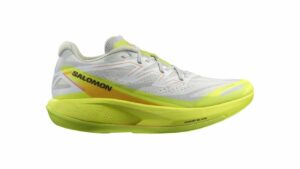Age is no deterrent for Kooymans
Blogger Rory Gilfillan has this look at masters talent Jerry Kooymans, who continues to beat runners much younger than him.
Jerry Kooymans isn’t a just good masters athlete. He’s a solid runner by any yardstick available.
Perhaps it’s his age, or maybe his grey hair or even a lingering prejudice that adheres to the stereotype that athletes north of 50 ought to be on the golf course rather than maintaining an almost unnatural ability to knock off people a third their age.
The bottom line remains that athletes who underestimate his ability, do so at their peril.
Losing Kooymans at the start means not seeing him until he has crossed the finish line, eaten a bagel and warmed down.
Kooymans started running 111,000K ago during the fall of 1971.
“I was in grade 10 and decided to join the school’s Miles Club, where you recorded your mileage and got a crest for running 500 miles,” he said. “I figured I could do that. One month after joining the club, the coach asked me to run in a road race.”
From there, Kooymans accrued a litany of personal bests that today would win races not by seconds but, in many cases, by minutes. Consider his 8:11 in the 3000, his outstanding 13:59 in the 5000m and a marathon best of 2:19:01. Last year, that would have put him in the top ten of Canadian marathon runners.
Anyone who has put the miles in understands, at a visceral level, that progress isn’t always linear. This is as true on an individual level as it is nationally. Decades ago, results that would only have been good enough for an “also ran” now earn victories. Some of this is due to the plethora of races nowadays but there has also been a significant decline in serious runners.
“When I started in the 70s, there weren’t that many road races. We mainly ran track and cross country. The road races that existed usually attracted less than 100 runners, but they were all serious runners. Road racing became more popular in the 80s for the elite runners, and the races were very competitive. I won one local 10K in 29:11, and third place was 29:13. I finished fifth in another local 10K with a time of 29:16. These days, the vast majority of people running road races are recreational runners, and the depth at the front of the pack seems to have fallen off.”
The statistics don’t lie. Beyond Alan Brookes’s Canada Running Series, which is a rare confluence of a successful charity drive that also generates outstanding athletic performances, it’s rare for a 10K to be won in a sub-30-minute time. “Races tend to be portrayed as mass participation charity fundraising events, where the athletic competition is secondary,” Kooymans said.
As an athlete, Kooymans has also been forced to change and adapt to a new reality as well.
“I got used to training very hard and running fast when I was younger. Now I have to constantly recalibrate. Over the years, I’ve had to reduce the mileage and the number and intensity of hard work-outs,” Kooymans.
“I hate getting injured,” he acknowledged. “It’s discouraging when an injury prevents me from running to the best of my ability. This happens more frequently now that I’m in my 50s. More often than not, my body breaks down before I find out how fast I can really go.”
Running, which has always rewarded those who can maintain the fragile balance between injury and high-intensity training, begins to reveal the very fabric of endurance to those who continue to run into their 50s and beyond. “It does get discouraging,” says Kooymans, “but when I have those periods of relatively good health, it makes it all worthwhile.”


